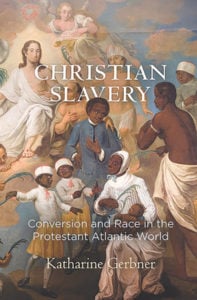Christian Slavery: Conversion and Race in the Protestant Atlantic World
Reviewed by Martin Kelley
January 1, 2020
 By Katharine Gerbner. University of Pennsylvania Press, 2018. 296 pages. $39.95/hardcover or eBook; $24.95/paperback.
By Katharine Gerbner. University of Pennsylvania Press, 2018. 296 pages. $39.95/hardcover or eBook; $24.95/paperback.
Buy from QuakerBooks
Among North American Friends, one of the most heavily trodden periods of historical storytelling is the founding of the Pennsylvania colony. A close second is Quakers’ embrace of abolition and our participation in the Underground Railroad. Family histories spin on these events. Embellished novels, historical plaques, and textbooks recount these events in hagiographic glory.
Historian Katharine Gerbner has dug through the archives of the era immediately preceding these events in Christian Slavery: Conversion and Race in the Protestant Atlantic World. Friends are only one part of a fascinating and tragic story as colonial Protestants tried to reconcile a new era of large-scale, global slavery with their spiritual ideals.
Much of the story goes through Barbados. This small island in the Caribbean was the first runaway success in the British leap across the Atlantic. With a thriving economy built on slavery, most British transatlantic shipping came through its port. It’s no surprise that early Friends ministers came through beginning in 1665. Their Quaker message spread like wildfire: in just a few years Barbados had the largest population of Friends outside of the British Isles.
But at a cost: over 80 percent of these new Quakers owned slaves. For Protestants in the Caribbean, “Christian” was code for free and White. The new Quakers on Barbados had commitment and zeal and adopted Friends’ language of freedom but seemed to find little irony in continuing to own slaves. Gerbner could find little documentation on the day-to-day life of Quaker slaves, yet noted that Joseph Besse’s landmark A Collection of the Sufferings of the People Called Quakers had 237 entries on Barbados.
It is a sign of the importance of the Barbados colony that George Fox traveled to the island. He was shocked by what he saw as the loose morals of the island’s slave culture, but didn’t condemn the institution. His writings on the subject lean heavily into a metaphor of a spiritual family: Barbadian Friends should organize around a natural, paternalistic social order. But in a shocking departure, he said this family should include enslaved people, who should be encouraged to worship with Friends. This was one of the first Protestant calls for slave conversion and an especially radical proposal in Barbados, where Christian identity conferred citizenship and expanded civil rights.
It is a shame that Barbadian Quakers’ spiritual outreach efforts were unsuccessful. Gerbner lists intriguing “overlaps between West African and Quaker religiosity” and claims a “handful of common characteristics between Quaker and Afro-Caribbean practices.” What happened? Barbadian authorities made joint worship illegal, but perhaps more to the point, Gerbner suggests that Barbadian Friends were more interested in disciplining one another over marriage practices than in worshiping with Africans. In any case, they took Fox’s family metaphor as a kind of divine license to continue to profit from slavery.
Fox’s more radical arguments for spiritual equality went on to have greater success in rival Protestant denominations. Much of Christian Slavery goes on to follow the work of Anglicans and Moravians in the Caribbean, who debated Fox’s “harangue” but went on to start successful missions that brought African slaves into their denominations and slowly began challenging the Christian ethics and colonial politics of slavery.
North American Friends don’t remember Barbados very often because its Quaker community imploded within a generation, wracked by internal schisms and a smallpox epidemic. But some of its colonists relocated their fortunes, slaves, and proslavery ideologies to William Penn’s new American colony and were there to receive an unusual statement.
In the mid-1680s, German-speaking Friends from the Rhine Valley settled outside Penn’s Philadelphia, and in 1688, they wrote a letter to their English coreligionists “against the traffik of men-body.” They insisted that spiritual freedom include physical freedom. They pointed to the fear European Whites had of becoming enslaved by Turks while traveling by ship and invoked the Golden Rule to ask why enslavement of Africans was any different. They even made a marketing appeal: they said their families back in the Rhine Valley were hesitating to join them because of prevalence of slavery. Slavery didn’t fit the brand image of the new Pennsylvania colony.
Their remarkably modern statement was passed up the hierarchy of Pennsylvania Quakers, where it was essentially tabled. Gerbner introduces us to George Gray, a recent emigrant from Barbados who self-consciously echoed George Fox’s familial paternalism to argue in favor of keeping slaves in Pennsylvania “untill they are in Some Measure brought into a Christian Life.” Philadelphia Friends would continue to own slaves for nearly a century. An argument could be made that Fox’s Barbadian rationales have echoed through centuries of Quaker controversies and haunt us still.



Comments on Friendsjournal.org may be used in the Forum of the print magazine and may be edited for length and clarity.